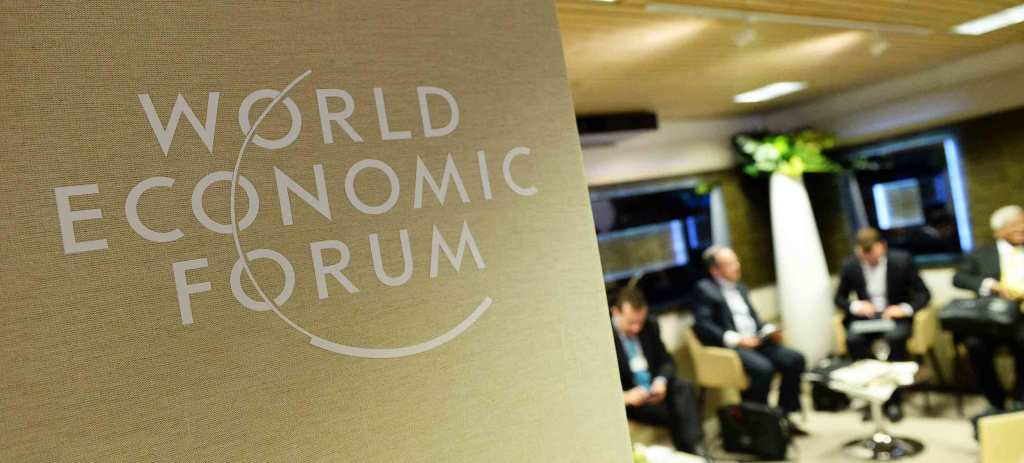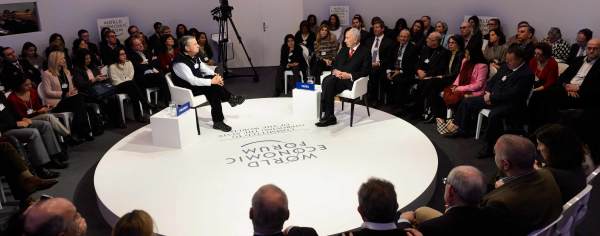 ©Ford Foundation
©Ford FoundationThe World Economic Forum Annual Meeting kicks off today in Davos. Influential leaders in business, politics, civil society, and other sectors will come together to discuss some of the most pressing issues facing the world today—including climate change, technology, and inequality. To mark the first day of the meeting, JUST Capital CEO Martin Whitaker answered five questions about the agenda at Davos and the role of business in building a more fair and equitable world.
The high cost of entry to participating at the World Economic Forum means that vast majority of people attending are from the wealthiest one percent. Why should the one percent care about growing inequality in the world?
Quite simply, the one percent should care because morally, economically, politically and socially it is in their best interest to do so. Human progress and prosperity hinges on access to opportunity for all. Inequality that limits such access creates a vicious circle that fundamentally impedes our collective ability to build the kind of future we want and need.
Copious empirical evidence shows that extreme levels of inequality stifle economic growth (or worse, cause stagnation or recession), undermine productivity, and curtail progress. Over the past few decades, however, the conversation has become about more than money. Inequality is arguably a life-or-death issue. There is a clear and undeniable relationship between income inequality and social problems, including life expectancy, homicide rates, infant mortality, and much more. And according to a 2013 report published by the National Research Council and the Institute of Medicine, “On nearly all indicators of mortality, survival and life expectancy, the United States ranks at or near the bottom among high-income countries.” Although the income gap is certainly not the only factor contributing to this worrying trend, we need to look hard at how it is affecting long-term health and well-being, and how we can use economic levers to help drive sustainable solutions.
At JUST Capital we stand for fairness, balance, and equality of opportunity; and for a market economy that allows all citizens to participate in ways that reflect their values.
One of themes being considered at Davos this year is how new kinds of public-private partnerships might address issues related to the global commons. What is the biggest problem attached to the global commons right now, and how can we incentivize businesses and governments to work together to solve it?
The “tragedy of the commons” is undoubtedly a fundamental challenge of unchecked capitalism. But the forces that give rise to it are also deeply ingrained within the human psyche—and are an important element of free market enterprise. Areas with the greatest potential for public-private partnerships are those where the resources and attributes of each can combine to create a multiplier effect, whereby the outcomes are many times more effective than they would be absent such a collaboration. For example, the advancement of low carbon technologies is an area where the ability of the public sector to set carbon prices, apply early stage research and development capital, and accelerate distribution complements the ability of the private sector to bring innovation, capital at scale, business expertise, and efficiency to the table. Similar partnership benefits are clear in areas including Internet access, education, financial services, and food production.
All of that said, we believe that one of the greatest problems we face relating to the global commons is not any one issue but rather one of culture: In particular, a market culture that strips capitalism of any humanity and incentivizes and rewards short-term financial gain at the expense of the broader social good.
How do we break this chain? We believe at least part of the answer has to be getting more and better information into the hands of market participants, information that allows them to connect the dots about how acting with more enlightened self-interest can actually produce better long term consequences both individually and collectively.
In that vein, we believe that one way for the private sector to work with government is to help gather data, incentivize transparency, and require disclosure. The more the public knows about the issues that affect them and that they care about—from climate change and fair pay to human rights and taxes—the easier it will be for them to take actions that redirect resources to those providing solutions.
At Davos, Fortune 500 CEOs weigh issues that affect not only business, but society as whole. Outside of this gathering, though, most CEOs focus their time and attention on shareholder value. Day to day, how do we get CEOs to think beyond shareholder value and consider the broader societal impacts of doing business?
This is at the very heart of our mission. In our view, CEOs will only look beyond shareholder value if they are incentivized and rewarded for doing so. To do this, they need greater knowledge about what motivates their customers, their employees, their investors, and other stakeholders beyond just shareholders. In our conversations with executives, we see the pressure they face to maximize profits for their shareholders, often at the expense of other values. We don’t believe that focusing exclusively on shareholders builds great businesses over time.
To bridge the divide, we are building a nonprofit market information platform centered on justness. It will use market forces to inspire and reward changes in how companies pursue a higher purpose.
At the heart of this platform is a new benchmark for business that measures and ranks companies based on how they perform on the issues the public cares most about. To understand what these issues are, we have implemented an exhaustive, multi-phase market research strategy—beginning with qualitative and moving into various phases of quantitative— that in 2015 reached over 43,000 individuals across the USA. Our research is a nationally representative sample that is mapped and weighted to the US census.
Each year we will publish the JUST Index, a list of the 100 most just companies in the country. We will also create actionable insights and tools that not only link justness to business performance, but also empower companies to improve their behavior.
Another major theme at Davos this year is technology, with particular attention to how it is reshaping all aspects of our lives and society. Is technology perpetuating inequality, or helping to narrow the gap?
The answer is both. Technology is just a tool: it can be used to produce and perpetuate any number of outcomes, both good and bad. And since the industrial revolution, we’ve seen how technological advancement fundamentally alters the relationships between labor and capital, between employees and owners. So this is not a new thing. To us, the real issue is ensuring fair and equitable access to technology and its benefits, and understanding the ways technology can be used to perpetuate or reduce inequality.
As such, there is a critical need for business and government programs that promote equal access to technology, that allow technology to be developed and deployed widely in support of human progress, and that stimulate innovation in the underlying forms and applications of technology. Knowledge is indeed power. And we are still in an era where access to information is transforming the way the entire world shares knowledge, whether in movement building, identifying and understanding problems, driving solutions, or simply helping to separate fact from myth.
If you were to take JUST Capital’s mission and break it down to one core idea, it is that people—as consumers, business leaders, investors, concerned citizens, politicians, employees, or otherwise—will behave differently if they are given the right data to shape their decisions. And that could be incredibly transformative in reshaping our marketplace.
Accessibility Statement
- All videos produced by the Ford Foundation since 2020 include captions and downloadable transcripts. For videos where visuals require additional understanding, we offer audio-described versions.
- We are continuing to make videos produced prior to 2020 accessible.
- Videos from third-party sources (those not produced by the Ford Foundation) may not have captions, accessible transcripts, or audio descriptions.
- To improve accessibility beyond our site, we’ve created a free video accessibility WordPress plug-in.
Is capitalism at odds with advancing social justice and tackling economic inequality?
In my #InequalityIs video (see above), I talk about my time in Edinburgh, where Adam Smith, the father of capitalism, is buried. Adam Smith believed that humanity’s pursuit of self-interest would naturally contribute to the social good. He believed that capitalism wasn’t at odds with social justice at all. Today, I wonder what he would think. Would he change his views about the values of capitalism, or would he argue that something has prevented capitalism from taking its fullest form? I truly believe that capitalist ideals are not intrinsically at odds with social justice. At its best, capitalism creates opportunity for everyone, inspiring healthy competition and improving our society. JUST Capital is founded on the belief that the very laws of capitalism can be leveraged to help right the system. But if we are to solve the problems of injustice and inequality that have taken such deep root in our world today, we cannot afford to take a narrow or singular approach. All of us— whether nonprofits, businesses, government, consumers, academics, and social enterprises—must contribute to fostering change. And the more we work together, the more effective those contributions will be.
JUST Capital CEO Martin Whittaker is a featured participant in #InequalityIs, a series from the Ford Foundation exploring inequality in all its forms. Tell us what inequality means to you, using #InequalityIs.


